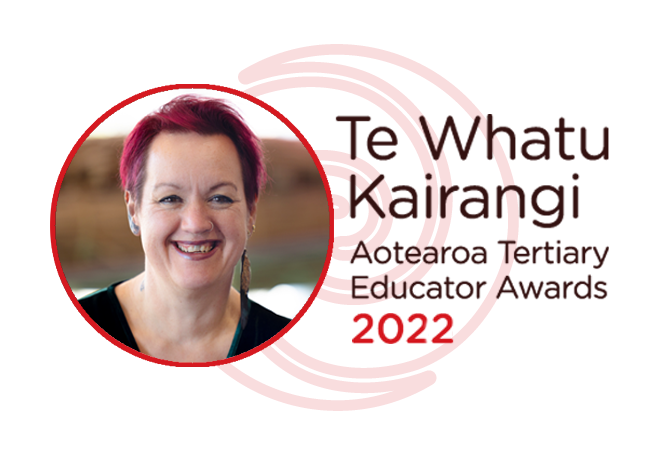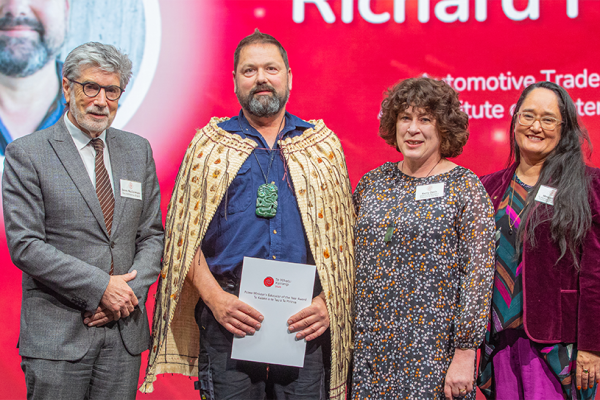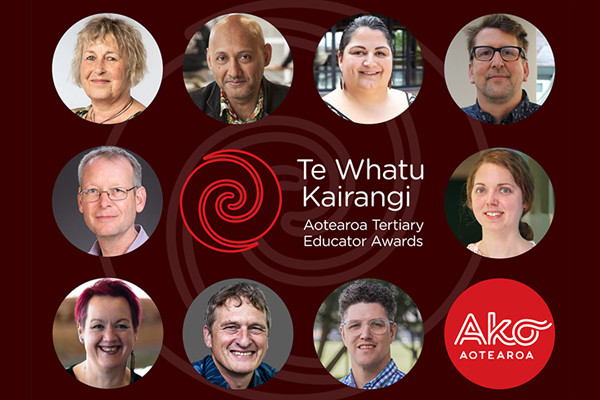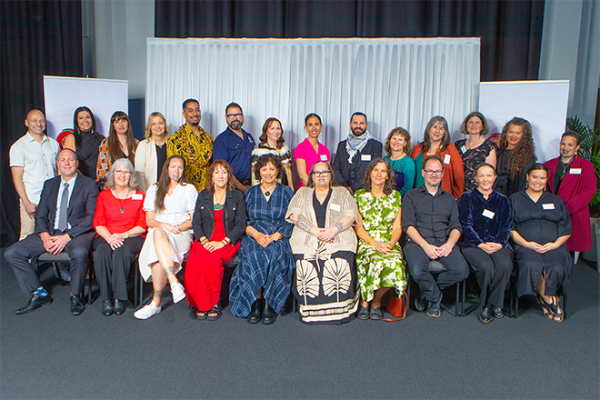Rachel Hinekiwi Keziah Dibble
A personal and professional tenacity resounding in teaching excellence
Te Whatu Kairangi Award | Kaupapa Māori
Senior Lecturer, Social Services Te Kura Matatini ki Otago | Otago Polytechnic | Te Pūkenga
Watch Rachel Dibble's Teaching profile video
“I redefine myself in the teaching space, as a wahine from mātauranga navigators of whenua (both land and placenta) stars and sea. I encourage learner definition of self, as responsive Tangata Whenua, Tangata Tiriti, to whakamana (support empowerment) the person they are working with. Context is everything.”
Both Rachel’s kuia, Kerry, and her mother, Roseanne, made sure Rachel knew where her Tūrangawaewae is - Taranaki, and their whakapapa to Ngāti Ruanui me Ngā Ruahine. As a young person, Rachel’s formal education did not cover ‘being Māori’ and whānau migration meant her upbringing was largely away from her Tūrangawaewae. However, through her whānau kōrero, she knew she was connected to where her tīpuna bones lay, not through the myths of quartered and fractionated ‘blood quantum’. In 1998, her study at Christchurch College of Education strengthened that potentially fractionated foundation of ‘Māori’ when she attended a ‘for tauira Māori only’ Tiriti o Waitangi workshop. The mana-enhancing practice she experienced over those two days directly authenticate how she facilitates Te Tiriti content today and established the whenua, the grounding, of her kaupapa Māori-led education. She acknowledges the stories of mana whenua as theirs to tell and can talk to her own authentic links to place, from Taranaki to Otago.
“I avoid being the ‘lecturer in the front of the room’ that ‘owns knowledge’ as I experienced in my tertiary education. I have the capacity to sit alongside and learn from tauira experiences. This is how I understand ako as educational practice.”
Rachel teaches into the space of identity, knowing who ‘we’ are and where ‘we’ come from. She asks what informs this identity and where this identity formation/information comes from. These questions are fundamental to the kōrero she has woven through the areas of delivery in the Bachelor of Social Services (BSS), such as ‘Te Tiriti o Waitangi, Ethics and Law’, ‘Personal and Academic Effectiveness’ and ‘Diversity’ and ‘Wānaka’ (Kāi Tahu dialect – Wānanga, where the learners noho – sleep over at a rūnaka marae). She encourages ako, understanding this as a reciprocity of learning. Her teaching philosophy is underpinned by critical awareness of Māori suicide rates and colonial settler institutions in which Tangata Whenua and Tangata Tiriti exist together. Her heart mahi is a Tiriti o Waitangi educator, where she finds the deepest of mamae and expressions of continuous hope for the future.
Awareness of colonised realities is critical to Rachel’s approach to Kaupapa Māori-led education and authenticity. Informed ‘by Māori, with Māori, and for Māori’ and working in an institutional non-Māori space, she endeavours to create spaces externally, philosophically, and internally for tauira Māori and Tangata Tiriti to experience ‘seeing themselves in the room’. Her ‘application to context’ considers Te Tiriti o Waitangi ‘theory’ and application through learning historical context and contemporary realities (statistics), experiences at local marae, and listening to (not speaking for) mana whenua. Beginning their first year with karakia and whakatauki, Ka mua, ka muri, her learners are walking into a mana enhancing, culturally responsive future, better informed about a shared past in Aotearoa me te Waipounamu.
“I encourage thinking.... This is how I embody Kaupapa Māori educational practice, noting Kaupapa Māori research methodology through the idea of transformation, and transformative learning.”
Rachel finds teaching across courses enables interweaving of kaupapa and relationships, emphasising concepts of transformational change and supporting learners to be ‘agents of change’ – and her learners appear to have gained from this approach. Her practice also includes multimedia approaches, such as the use of spoken work poetry by Te Kahu Rolleston and Ngā Hinepūkōrero, music by Alien Weaponry, Anika Moa, Six60, Troy Kingi, and others, waiata, and Māori focussed films like Mita’s Patu!, Rotondo’s Orphans, and Kingdoms and Currie’s Rūrangi, which she sees as vital to transformative experiences. Group discussions focus on ‘who are we, when we are kanohi ki te kanohi?’, and explores self-identity in order to be able to recognise racism, homophobia, sexism, and ableism.
Rachel’s early teaching experiences led her to bring about innovative change in the curriculum. For instance, Te Tiriti o Waitangi content was initially taught and assessed within eight weeks. As this did not work well, especially because of the limited time learners had to integrate content meaningfully, Rachel advocated for change. For the past four years the course has been delivered over a full semester, ensuring mana whenua concepts are ‘showcased’. From 2021, a co-delivery model of teaching has further expanded learner experience opportunities. Similarly, the Year Two Bachelor of Social Services Noho Marae (overnight stay) was held in late October, meaning a new, assessed experience sharing of pepeha in a mihimihi occurred concurrently to preparing a ‘summary of practice’ final portfolio presentation. As this was causing anxiety, Rachel proposed a change (implemented in 2019) to late June, not only aligning the noho with Matariki/ Puaka, but allowing learners to better engage in the assessment.
Rachel has contributed to the development of many courses on the BSS programme, including BSS 1: Te Tiriti o Waitangi, Ethics and Law (2021), BSS 2: Wānaka – including Noho Marae experience, and BSS 3: Communicating with Families/ Whānau and Communities (2020). These show clear integration of Māori kaupapa, pedagogy, and values, and the Māori Strategic Framework (MSF) into the BSS curriculum. She was awarded an Excellence Award in 2021 and, in 2018, the Excellence in Implementing the Māori Strategic Framework award in recognition of sharing and engaging with Mātauranga Māori. She introduces her learners to a narrative of te reo as metaphoric, literal, and poetic, and integrates content into subjects that have lacked a te reo or te Tiriti focus, also nurturing the usage of kupu Māori (like Tangata Whenua, Tangata Whaiora, and Tākatapui) in assessments. She also encourages learners to priortise te reo and a structured hui process when using models like the Meihana model by Pitama, Robertson, Cram, Gillies, Huria, and Dallas-Katoa (2007), allowing kōrero on racism, marginalisation, and colonisation.
Rachel believes it is vital to have more Tiriti o Waitangi and kaupapa Māori-focused educators. Her ten years of Tiriti teaching has essentially been figuring out what works (and how to manage when it does not) in a ‘silo’. Her Master of Professional Practice focusses on what is happening in the room, and the consequence of this for the educator. Preliminary findings suggest co-delivery has better consequences of tautoko compared to sole educator delivery. This year (2022) she enjoyed the opportunity to mentor a young wahine into the role of Tiriti educator for a Certificate level course.
“Her positive influence on the teaching practice of others is to successfully advocate for a team-teaching approach for Te Tiriti and Wānaka courses which aligns with the Kaupapa Māori methodology, where the concept of ako provides a space for all learners and teachers to benefit from each other’s knowledge.” - Staff Excellence Award Nomination



